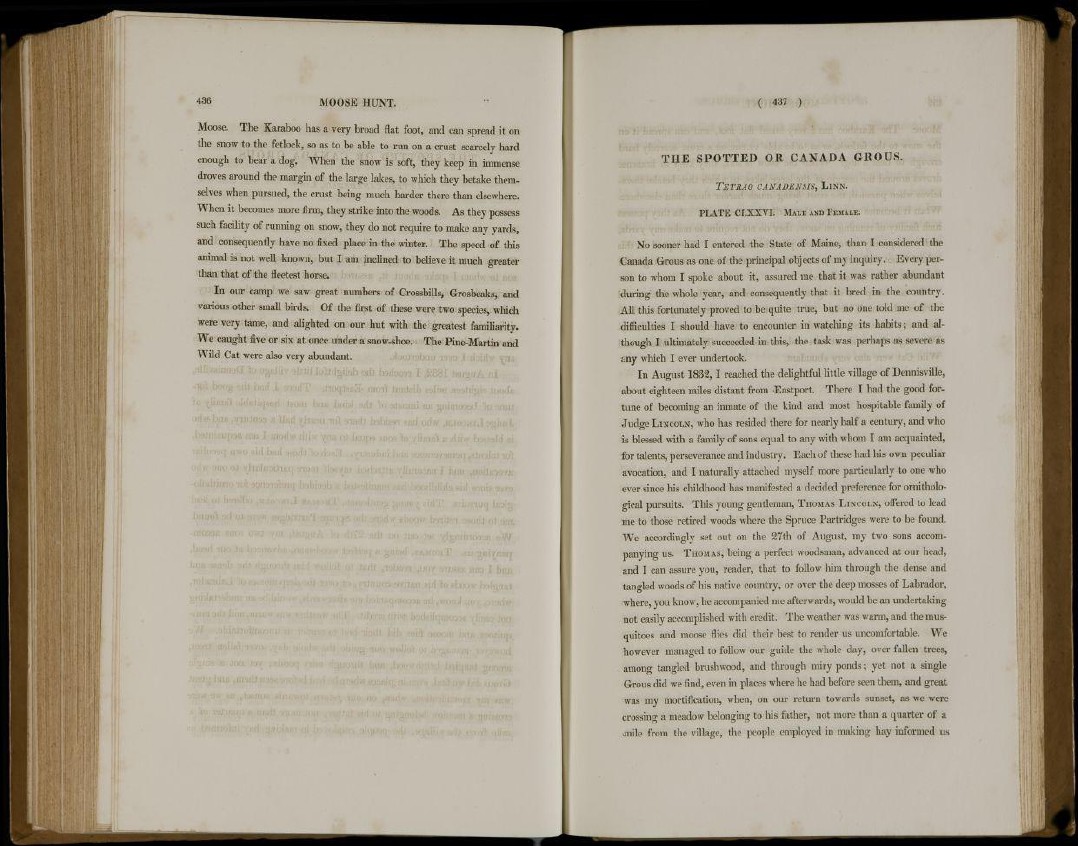
436 MOOSE HUNT.
Moose. The Karaboo has a very broad flat foot, and can spread it on
the snow to the fetlock, so as to be able to run on a crust scarcely hard
enough to bear a dog. When the snow is soft, they keep in immense
droves around the margin of the large lakes, to which they betake themselves
when pursued, the crust being much harder there than elsewhere.
When it becomes more firm, they strike into the woods. As they possess
such facility of running on snow, they do not require to make any yards,
and consequently have no fixed place in the winter. The speed of this
animal is not well known, but I am inclined to believe it much greater
than that of the fleetest horse.
In our camp we saw great numbers of Crossbills, Grosbeaks, and
various other small birds. Of the first of these were two species, which
were very tame, and alighted on our hut with the greatest familiarity.
We caught five or six at once under a snow-shoe. The Pine-Martin and
Wild Cat were also very abundant.
( 437 )
T H E SPOTTED OR CANADA GROUS.
TETRAO CANADENSIS, LlNN.
P L A T E C L X X V I . MALE AND FEMALE.
No sooner had I entered the State of Maine, than I considered the
Canada Grous as one of the principal objects of my inquiry. Every person
to whom I spoke about it, assured me that it was rather abundant
during the whole year, and consequently that it bred in the country.
All this fortunately proved to be quite true, but no one told me of the
difficulties I should have to encounter in watching its habits; and although
I ultimately succeeded in this, the task was perhaps as severe as
£.ny which I ever undertook.
In August 1832, I reached the delightful little village of Dennisville,
about eighteen miles distant from Eastport. There I had the good fortune
of becoming an inmate of the kind and most hospitable family of
Judge LINCOLN, who has resided there for nearly half a century, and who
is blessed with a family of sons equal to any with whom I am acquainted,
for talents, perseverance and industry. Each of these had his own peculiar
avocation, and I naturally attached myself more particularly to one who
ever since his childhood has manifested a decided preference for ornithological
pursuits. This young gentleman, THOMAS LINCOLN, offered to lead
me to those retired woods where the Spruce Partridges were to be found.
We accordingly set out on the 27th of August, my two sons accompanying
us. THOMAS, being a perfect woodsman, advanced at our head,
and I can assure you, reader, that to follow him through the dense and
tangled woods of his native country, or over the deep mosses of Labrador,
where, you know, he accompanied me afterwards, would be an undertaking
not easily accomplished with credit. The weather was warm, and the musquitoes
and moose flies did their best to render us uncomfortable. We
however managed to follow our guide the whole day, over fallen trees,
among tangled brushwood, and through miry ponds; yet not a single
Grous did we find, even in places where he had before seen them, and great
was my mortification, when, on our return towards sunset, as we were
crossing a meadow belonging to his father, not more than a quarter of a
anile from the village, the people employed in making hay informed us